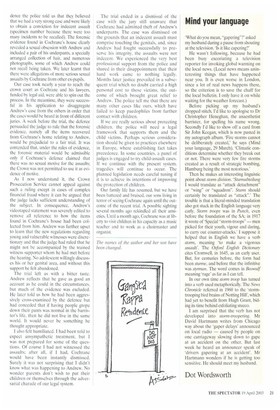Mind your language
'What do you mean, "gapering"?' asked my husband during a pause from shouting at the television. 'Is it like capering?'
He wasn't following, because he had been busy excoriating a television reporter for invoking global warming on the local news. (Local news means uninteresting things that have happened near you. It is even worse in London, since a lot of real news happens there, so the criterion is to save the chaff for the local bulletin. I only have it on while waiting for the weather forecast.) Before picking up my husband's dropped stitch, I'd like to apologise to Dr Christopher Heneghan, the anaesthetist barrister, for spelling his name wrong. Secondly I'd like to show off a card from Sir John Keegan, which is now pasted in my autograph album. 'Fire storms cannot be deliberately created,' he says (Mind your language, 29 March). 'Climatic conditions determine whether they break out or not. There were very few fire storms created as a result of strategic bombing, Hamburg being the most notorious.'
Then he makes an interesting linguistic point about storm division.`Sturmabteilung I would translate as "attack detachment" or "wing" or "squadron". Sturm should certainly be translated as "attack".' The trouble is that a literal-minded translation also got stuck in the English language very early. Storm troops was in Punch, even before the foundation of the SA; in 1917 it wrote of 'Special "storm-troops" — men picked for their youth, vigour and daring, to carry out counter-attacks.' I suppose it helped that in English we have a verb storm, meaning 'to make a vigorous assault'. The Oxford English Dictionary cites Cromwell, in 1645, as an early user. But, for centuries before, the form had been stutme, and before that the infinitive was styrman. The word comes in Beowulf meaning 'rage' as far as I can tell.
In our own time storm troop has turned into a verb used metaphorically. The News Chronicle referred in 1960 to the 'stormtrooping bird brains of Notting Hill', which had yet to benefit from Hugh Grant, biding its time behind exfoliating stucco.
I am surprised that the verb has not developed into storm-troopering. Mr David Hartmann writes from Chicago way about the 'gaper delays' announced on local radio — caused by people on one carriageway slowing down to gape at an accident on the other. But last week he heard an announcer speak of 'drivers gapering at an accident'. Mr Hartmann wonders if he is getting too sensitive. He should meet my husband.
Dot Wordsworth


































































 Previous page
Previous page